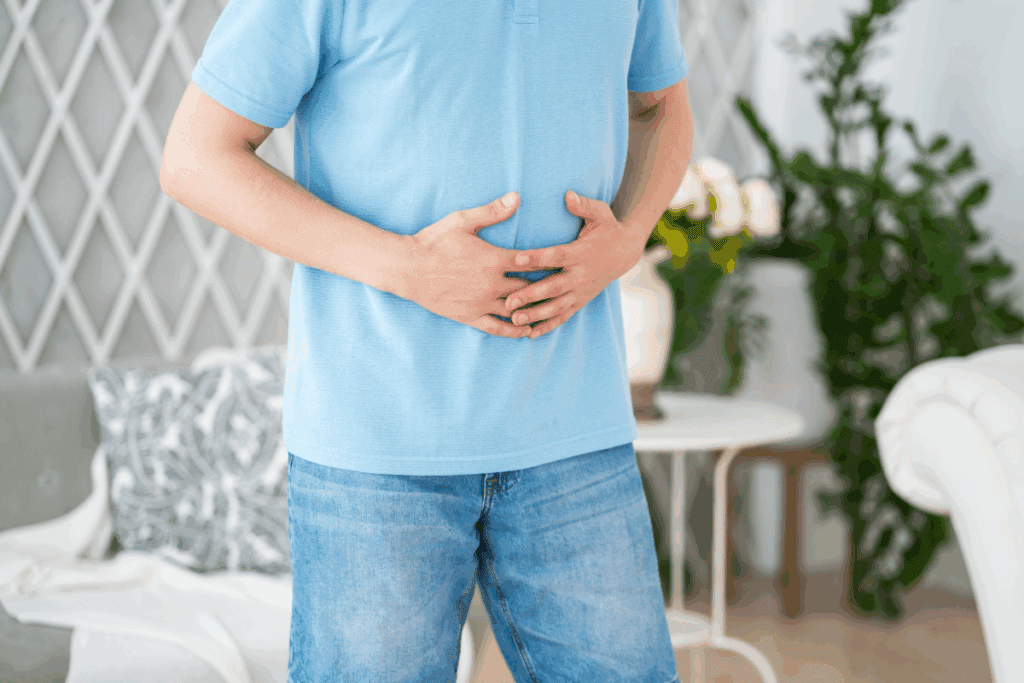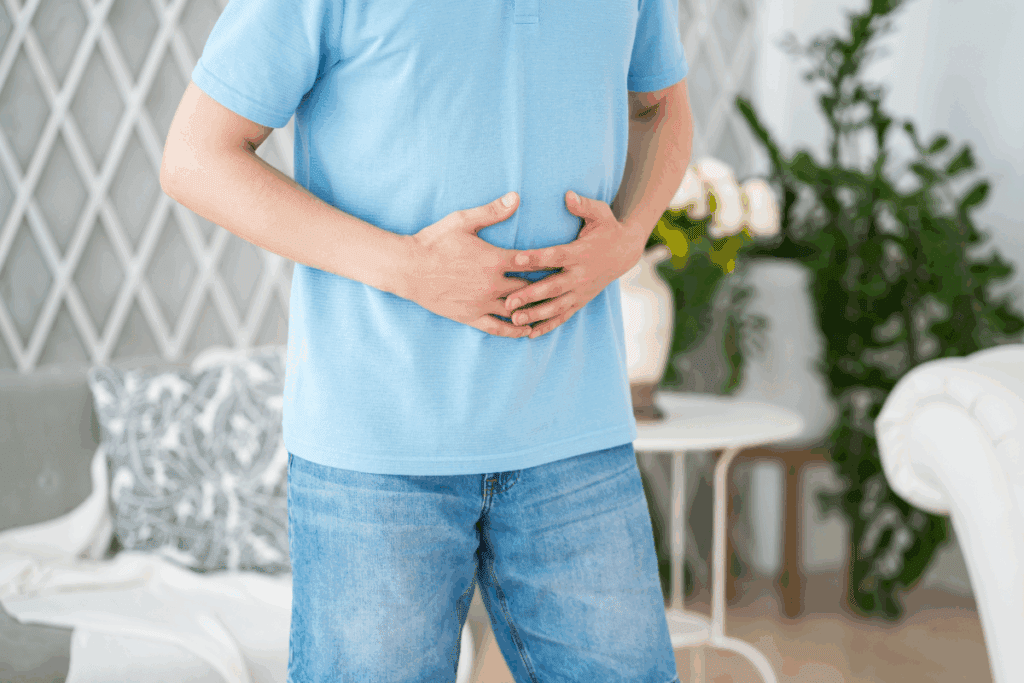
Having a cholecystectomy, or gallbladder removal surgery, is a major change for your body. It affects how you digest food — especially fats — and can also impact how your body reacts to alcohol.
Many patients wonder, can you drink after gallbladder removal? Doctors generally recommend waiting at least two weeks before drinking alcohol. This waiting period allows your body to heal properly and helps prevent digestive issues or discomfort.
Understanding how your body functions after surgery is essential for a smooth recovery. At Liv Hospital, patients receive personalized guidance on post-surgery habits — including safe timelines for drinking again and maintaining a healthy lifestyle.
Key Takeaways
- Wait at least two weeks after surgery before consuming alcohol.
- The gallbladder plays a role in digestion, specially in processing fats.
- Removal of the gallbladder can affect how the body handles certain foods and drinks.
- Moderation is key when resuming alcohol consumption.
- Expert hospital guidance can help in making informed decisions about alcohol consumption post-surgery.
Understanding Gallbladder Function and Removal

The gallbladder is a small organ under the liver that helps with digestion. It stores bile from the liver and releases it into the small intestine. This helps break down fats. Knowing how the gallbladder works and what happens when it’s removed is key for those having cholecystectomy.
The Role of Your Gallbladder in Digestion
The gallbladder releases bile into the small intestine during meals. This bile is important for breaking down fats. Without a gallbladder, some people might feel uncomfortable or have digestive issues with fatty foods or alcohol.
Common Reasons for Gallbladder Surgery
Gallbladder removal surgery, or cholecystectomy, is often needed for gallstones and other diseases. The main reasons for this surgery are:
- Gallstones causing pain or infection
- Gallbladder inflammation (cholecystitis)
- Gallbladder polyps or cancer
Types of Gallbladder Removal Procedures
There are different ways to remove the gallbladder, including laparoscopic and open cholecystectomy. Each method has its own recovery time and things to consider.
| Procedure Type | Description | Recovery Time |
| Laparoscopic Cholecystectomy | Minimally invasive surgery with several small incisions | 1-2 weeks |
| Open Cholecystectomy | Traditional surgery with a single larger incision | 4-6 weeks |
It’s important for patients to understand these procedures. This helps them make the best choices for their care.
The Post-Surgery Recovery Timeline

Knowing the recovery timeline after gallbladder removal is key for patients. It helps them manage their expectations and heal smoothly. The recovery is divided into phases, each with its own needs.
Initial Recovery Phase (First 48 Hours)
The first 48 hours after surgery are very important. Patients should rest and follow their doctor’s advice. They might feel pain, discomfort, and tiredness. Rest and staying hydrated are essential for recovery.
Those who have laparoscopic cholecystectomy might go home the same day or after one night. It’s important to have someone with them at home for the first night.
Early Recovery Period (First Two Weeks)
In the first two weeks, patients start to feel better and can do more. Eating light meals is important during this time. They should start with easy-to-digest foods and then add more solid foods as they can.
They should also avoid heavy lifting and hard work. Following the doctor’s advice on what to eat and do is very important for a good recovery.
Complete Healing and Adjustment (1-3 Months)
It can take one to three months to fully heal and adjust after gallbladder removal. Patients might need to stick to certain diets. They might also have changes in digestion, like diarrhea or fatty stools, as their body gets used to not having a gallbladder.
Keeping a symptom journal can help patients track their progress. It can also help them notice any patterns or concerns to talk to their doctor about.
Remember, being patient and following medical advice is important for a good recovery. Here’s a general timeline of recovery:
| Recovery Phase | Duration | Key Activities/Recommendations |
| Initial Recovery | First 48 Hours | Rest, hydration, follow post-surgery guidelines |
| Early Recovery | First Two Weeks | Gradual return to normal activities, dietary adjustments |
| Complete Healing | 1-3 Months | Continue dietary recommendations, monitor digestive changes |
It’s usually advised to wait at least two weeks before drinking alcohol after surgery. This helps the body heal and reduces the risk of problems.
When Can You Drink After Gallbladder Removal
Knowing when it’s okay to drink alcohol after gallbladder surgery is key for a smooth recovery. The body’s way of digesting alcohol changes after surgery. It’s important to follow the doctor’s advice.
Medical Guidelines for Alcohol Consumption
Doctors usually tell patients to wait at least two weeks before drinking alcohol. This two-week waiting period helps avoid complications and lets the body heal.
The Critical Two-Week Waiting Period
The first two weeks after surgery are very important. The body is getting used to not having a gallbladder. Drinking alcohol too soon can stress the liver and digestive system.
It’s important to wait for your doctor’s okay before drinking again. They can check how you’re doing and give advice tailored to you.
Factors That May Extend Your Waiting Time
Several things can affect how long you should wait to drink alcohol after gallbladder surgery. These include:
- Overall health and any complications
- How well you can handle alcohol
- Any other health conditions
Changing how you drink alcohol after gallbladder surgery is important. Drinking in moderation and choosing the right drinks can help avoid discomfort and problems.
By knowing these guidelines and factors, patients can make better choices about drinking after gallbladder surgery. This ensures a safer and healthier recovery.
How Your Digestive System Changes Without a Gallbladder
Without a gallbladder, your digestive system changes a lot. The liver keeps making bile, but it goes straight to the small intestine. This is different from before.
Bile Production and Storage Differences
Now, your body always sends bile into your digestive system. This can make digesting fats harder for some people. It might also cause stomach discomfort.
Bile Production Changes:
- The liver keeps making bile, but it’s not stored.
- Bile goes straight to the small intestine.
- This can change how fats are digested.
Fat Digestion Without a Gallbladder
Fats are harder to digest without a gallbladder. Bile helps break down fats. Without it, some people might have trouble digesting fatty foods. They might also get diarrhea or have fatty stools.
- Difficulty digesting fatty foods.
- Diarrhea or fatty stools.
- Discomfort after eating high-fat meals.
A gastroenterology expert says, “People without a gallbladder might need to change their diet. This can help manage their symptoms.”
Long-term Digestive Adaptations
Over time, many people get used to these changes. Their body finds new ways to use bile.
Adaptation Strategies:
- Eating smaller, more frequent meals.
- Avoiding high-fat foods.
- Slowly trying different foods to see how they react.
By understanding these changes and making the right diet choices, people can handle their digestive health after losing their gallbladder.
Alcohol Metabolism Without a Gallbladder
The liver is key in breaking down alcohol, even more so after a gallbladder is removed. Alcohol metabolism without a gallbladder shows how the liver handles alcohol and how not having a gallbladder changes this.
Liver Function and Alcohol Processing
The liver turns alcohol into safer substances. Doctors say, “The liver’s ability to metabolize alcohol is key to reducing its harm.” This process is essential for lessening alcohol’s effects on the body.
Liver function is vital in alcohol breakdown, and its efficiency impacts how fast alcohol is processed. Without a gallbladder, the flow of bile into the intestine might change alcohol digestion. This could lead to different reactions in people.
How Missing Bile Storage Affects Alcohol Digestion
Without a gallbladder, bile flow changes. This affects alcohol digestion, as bile helps with fat digestion, which alcohol can impact.
Some people may face digestive reactions to alcohol after gallbladder removal, from mild to severe. Opting for clear spirits or wine might ease discomfort.
“Clear spirits and wine are generally better tolerated after gallbladder removal.” They are less likely to upset the stomach compared to other drinks.
Common Digestive Reactions to Expect
After gallbladder removal, alcohol reactions can change. You might feel digestive discomfort or diarrhea. Watching these signs and adjusting your drinking can help manage them.
- Notice how your body reacts to different alcohols.
- Begin with small amounts to find your limit.
- Keep a journal of your symptoms to track them.
Knowing how alcohol is broken down without a gallbladder and being aware of digestive reactions helps make better choices about drinking after surgery.
Potential Risks of Drinking With No Gallbladder
Removing the gallbladder changes how the body handles alcohol. This can lead to health problems. It’s important to know these risks to stay healthy.
Digestive Discomfort and Diarrhea
Digestive discomfort and diarrhea are common issues. Without a gallbladder, the body can’t digest fats well. This can cause stomach problems when drinking alcohol.
Increased Liver Strain Considerations
The liver works hard to process alcohol, and without a gallbladder, it’s harder. Excessive alcohol can strain the liver more. This can worsen conditions like fatty liver disease.
Medication Interactions to Be Aware Of
People without a gallbladder might take medicines that react with alcohol. Knowing these interactions is key. Always talk to a doctor before drinking.
If you’ve had your gallbladder removed, talk to your doctor about drinking. They can explain the risks for you. This helps you make smart choices about drinking.
Best Alcohol Options After Gallbladder Surgery
Choosing the right alcohol after gallbladder surgery is key to avoiding digestive issues. Some drinks are easier on the stomach than others. It’s important to know which ones are best.
Clear Spirits and Their Digestive Benefits
Clear spirits like vodka or gin are good choices after gallbladder surgery. They have fewer congeners, which are substances that can cause hangovers and stomach problems. Clear spirits are generally easier to digest, making them a good option for those who have had their gallbladder removed.
Wine Considerations and Tolerance
Wine can also be okay in small amounts after gallbladder surgery. Start with a little to see how you feel. It’s also worth noting that dry wines tend to have fewer congeners and less sugar, making them a better choice than sweeter wines.
Serving Sizes and Dilution Recommendations
Knowing serving sizes and diluting drinks with water or low-calorie mixers can help. A standard serving size for spirits is 1.5 ounces, and for wine, it’s 5 ounces. Diluting drinks can make them easier to digest by reducing alcohol and congeners.
| Beverage Type | Recommended Serving Size | Dilution Recommendation |
| Clear Spirits | 1.5 oz | Mix with water or low-calorie mixer |
| Wine | 5 oz | Consume as is or with a small amount of water |
By picking the right alcohol and watching serving sizes, you can enjoy your drinks without too much trouble after gallbladder surgery.
Alcoholic Beverages to Approach With Caution
The type of alcohol you choose can affect your digestion after gallbladder surgery. Some drinks might cause more discomfort than others. This is true even if you drink in moderation.
High-Fat Content Drinks
Drinks with lots of fat, like creamy liqueurs, can be hard on your stomach. Without a gallbladder, your body can’t digest fats as well. This might lead to bloating, discomfort, or diarrhea.
Examples of high-fat content drinks to approach with caution include:
- Cream-based cocktails
- Rich, creamy liqueurs like Baileys Irish Cream
- Certain dessert wines with high sugar and fat content
Sugary Cocktails and Mixed Drinks
Sugary drinks can also upset your stomach. The body reacts differently to sugar without a gallbladder. This can cause nausea, diarrhea, or discomfort.
Be cautious with:
- Cocktails with high-sugar mixers or syrups
- Fruity drinks with added sugars
- Dessert cocktails that combine alcohol with sweet, creamy ingredients
Beer and Carbonated Alcoholic Beverages
Beer and carbonated drinks might also cause issues. The carbonation can lead to bloating. The alcohol can stress your stomach even more. People without a gallbladder might find these drinks harder to handle.
Start with small amounts of beer or carbonated drinks to see how you react. If you feel uncomfortable, try drinking less or less often.
Developing Your Personal Alcohol Tolerance Plan
Knowing how your body reacts to alcohol after gallbladder removal is important for safe drinking. “Listening to your body is key to managing alcohol well,” it helps you make smart choices about drinking.
Starting With Small Amounts and Monitoring
Start with small amounts of alcohol when you begin again. This careful step lets you watch how your body reacts. Begin with a minimal serving size and see how you feel before drinking more.
Keeping a Symptom Journal
Keeping a symptom journal is a great way to track your body’s alcohol reaction. It helps you see how much you can handle. Note the type of alcohol, the amount, and any symptoms to understand your limits better.
Adjusting Based on Your Body’s Responses
Your body’s reaction to alcohol is a big clue for how to drink. If you feel bad or uncomfortable, you need to adjust your drinking. This might mean drinking less or avoiding some types of alcohol.
Remember, being patient and careful is important as you figure out your drinking plan. Paying attention to how your body feels and making smart choices helps you enjoy alcohol safely.
“The key to enjoying alcohol after gallbladder removal lies in understanding and respecting your body’s limits.”
Conclusion: Balancing Enjoyment and Health After Surgery
After gallbladder removal surgery, finding a balance is key. Liv Hospital ensures patients get the latest care advice. This helps them enjoy alcohol while staying healthy.
Knowing how the digestive system changes and the risks of alcohol is important. Making smart choices about drinking is essential for health and happiness.
To find this balance, health must come first. Following health guidelines is vital. Talking to doctors and listening to their advice helps enjoy alcohol safely. It’s all about making responsible choices for your health.
FAQ
When can I drink alcohol after gallbladder removal surgery?
It’s best to wait at least two weeks after surgery. This helps avoid complications and aids in healing.
Can I drink alcohol without a gallbladder?
Drinking alcohol without a gallbladder is possible. But, be aware of the risks like digestive issues and diarrhea. Always talk to a healthcare provider first.
How does the removal of the gallbladder affect alcohol digestion?
Without a gallbladder, bile goes straight to the small intestine. This can change how you digest alcohol and fats.
What types of alcoholic beverages are best to drink after gallbladder surgery?
Clear spirits like vodka or gin, and wine in moderation, are better. They have fewer congeners and are easier to digest.
Are there certain types of alcoholic beverages I should avoid after gallbladder surgery?
Yes, avoid drinks with high fat and sugar, like creamy liqueurs and many cocktails. Beer and carbonated drinks can also be tough on your stomach.
How can I develop a personal alcohol tolerance plan after gallbladder removal?
Start with small amounts and watch how your body reacts. Keep a journal of your symptoms. Adjust your drinking based on how you feel to keep your digestive system healthy.
Can drinking alcohol after gallbladder surgery increase liver strain?
Yes, drinking too much alcohol can strain your liver. Be careful with your drinking after gallbladder surgery.
Are there any medication interactions I should be aware of when drinking alcohol after gallbladder surgery?
Yes, your medications could interact with alcohol. Always check with your healthcare provider before drinking.
How long does it take to fully recover from gallbladder surgery?
Recovery can take one to three months. You’ll need to follow a diet and lifestyle changes during this time.
Can I drink alcohol after a laparoscopic cholecystectomy?
The same rules apply for drinking after gallbladder surgery, no matter the procedure. Wait at least two weeks and talk to your doctor before drinking.

Having a cholecystectomy, or gallbladder removal surgery, is a big deal. It changes how your body handles alcohol. The gallbladder is key for digestion, mainly with fats.
Patients often ask when they can drink alcohol again. Doctors usually say wait at least two weeks after surgery. This helps avoid problems and aids in healing.
It’s important to know how your body changes after gallbladder removal. This knowledge helps with recovery and making smart choices about drinking. Hospitals like Liv Hospital offer advice on safely drinking again.
Key Takeaways
- Wait at least two weeks after surgery before consuming alcohol.
- The gallbladder plays a role in digestion, specially in processing fats.
- Removal of the gallbladder can affect how the body handles certain foods and drinks.
- Moderation is key when resuming alcohol consumption.
- Expert hospital guidance can help in making informed decisions about alcohol consumption post-surgery.
Understanding Gallbladder Function and Removal

The gallbladder is a small organ under the liver that helps with digestion. It stores bile from the liver and releases it into the small intestine. This helps break down fats. Knowing how the gallbladder works and what happens when it’s removed is key for those having cholecystectomy.
The Role of Your Gallbladder in Digestion
The gallbladder releases bile into the small intestine during meals. This bile is important for breaking down fats. Without a gallbladder, some people might feel uncomfortable or have digestive issues with fatty foods or alcohol.
Common Reasons for Gallbladder Surgery
Gallbladder removal surgery, or cholecystectomy, is often needed for gallstones and other diseases. The main reasons for this surgery are:
- Gallstones causing pain or infection
- Gallbladder inflammation (cholecystitis)
- Gallbladder polyps or cancer
Types of Gallbladder Removal Procedures
There are different ways to remove the gallbladder, including laparoscopic and open cholecystectomy. Each method has its own recovery time and things to consider.
| Procedure Type | Description | Recovery Time |
| Laparoscopic Cholecystectomy | Minimally invasive surgery with several small incisions | 1-2 weeks |
| Open Cholecystectomy | Traditional surgery with a single larger incision | 4-6 weeks |
It’s important for patients to understand these procedures. This helps them make the best choices for their care.
The Post-Surgery Recovery Timeline

Knowing the recovery timeline after gallbladder removal is key for patients. It helps them manage their expectations and heal smoothly. The recovery is divided into phases, each with its own needs.
Initial Recovery Phase (First 48 Hours)
The first 48 hours after surgery are very important. Patients should rest and follow their doctor’s advice. They might feel pain, discomfort, and tiredness. Rest and staying hydrated are essential for recovery.
Those who have laparoscopic cholecystectomy might go home the same day or after one night. It’s important to have someone with them at home for the first night.
Early Recovery Period (First Two Weeks)
In the first two weeks, patients start to feel better and can do more. Eating light meals is important during this time. They should start with easy-to-digest foods and then add more solid foods as they can.
They should also avoid heavy lifting and hard work. Following the doctor’s advice on what to eat and do is very important for a good recovery.
Complete Healing and Adjustment (1-3 Months)
It can take one to three months to fully heal and adjust after gallbladder removal. Patients might need to stick to certain diets. They might also have changes in digestion, like diarrhea or fatty stools, as their body gets used to not having a gallbladder.
Keeping a symptom journal can help patients track their progress. It can also help them notice any patterns or concerns to talk to their doctor about.
Remember, being patient and following medical advice is important for a good recovery. Here’s a general timeline of recovery:
| Recovery Phase | Duration | Key Activities/Recommendations |
| Initial Recovery | First 48 Hours | Rest, hydration, follow post-surgery guidelines |
| Early Recovery | First Two Weeks | Gradual return to normal activities, dietary adjustments |
| Complete Healing | 1-3 Months | Continue dietary recommendations, monitor digestive changes |
It’s usually advised to wait at least two weeks before drinking alcohol after surgery. This helps the body heal and reduces the risk of problems.
When Can You Drink After Gallbladder Removal
Knowing when it’s okay to drink alcohol after gallbladder surgery is key for a smooth recovery. The body’s way of digesting alcohol changes after surgery. It’s important to follow the doctor’s advice.
Medical Guidelines for Alcohol Consumption
Doctors usually tell patients to wait at least two weeks before drinking alcohol. This two-week waiting period helps avoid complications and lets the body heal.
The Critical Two-Week Waiting Period
The first two weeks after surgery are very important. The body is getting used to not having a gallbladder. Drinking alcohol too soon can stress the liver and digestive system.
It’s important to wait for your doctor’s okay before drinking again. They can check how you’re doing and give advice tailored to you.
Factors That May Extend Your Waiting Time
Several things can affect how long you should wait to drink alcohol after gallbladder surgery. These include:
- Overall health and any complications
- How well you can handle alcohol
- Any other health conditions
Changing how you drink alcohol after gallbladder surgery is important. Drinking in moderation and choosing the right drinks can help avoid discomfort and problems.
By knowing these guidelines and factors, patients can make better choices about drinking after gallbladder surgery. This ensures a safer and healthier recovery.
How Your Digestive System Changes Without a Gallbladder
Without a gallbladder, your digestive system changes a lot. The liver keeps making bile, but it goes straight to the small intestine. This is different from before.
Bile Production and Storage Differences
Now, your body always sends bile into your digestive system. This can make digesting fats harder for some people. It might also cause stomach discomfort.
Bile Production Changes:
- The liver keeps making bile, but it’s not stored.
- Bile goes straight to the small intestine.
- This can change how fats are digested.
Fat Digestion Without a Gallbladder
Fats are harder to digest without a gallbladder. Bile helps break down fats. Without it, some people might have trouble digesting fatty foods. They might also get diarrhea or have fatty stools.
- Difficulty digesting fatty foods.
- Diarrhea or fatty stools.
- Discomfort after eating high-fat meals.
A gastroenterology expert says, “People without a gallbladder might need to change their diet. This can help manage their symptoms.”
Long-term Digestive Adaptations
Over time, many people get used to these changes. Their body finds new ways to use bile.
Adaptation Strategies:
- Eating smaller, more frequent meals.
- Avoiding high-fat foods.
- Slowly trying different foods to see how they react.
By understanding these changes and making the right diet choices, people can handle their digestive health after losing their gallbladder.
Alcohol Metabolism Without a Gallbladder
The liver is key in breaking down alcohol, even more so after a gallbladder is removed. Alcohol metabolism without a gallbladder shows how the liver handles alcohol and how not having a gallbladder changes this.
Liver Function and Alcohol Processing
The liver turns alcohol into safer substances. Doctors say, “The liver’s ability to metabolize alcohol is key to reducing its harm.” This process is essential for lessening alcohol’s effects on the body.
Liver function is vital in alcohol breakdown, and its efficiency impacts how fast alcohol is processed. Without a gallbladder, the flow of bile into the intestine might change alcohol digestion. This could lead to different reactions in people.
How Missing Bile Storage Affects Alcohol Digestion
Without a gallbladder, bile flow changes. This affects alcohol digestion, as bile helps with fat digestion, which alcohol can impact.
Some people may face digestive reactions to alcohol after gallbladder removal, from mild to severe. Opting for clear spirits or wine might ease discomfort.
“Clear spirits and wine are generally better tolerated after gallbladder removal.” They are less likely to upset the stomach compared to other drinks.
Common Digestive Reactions to Expect
After gallbladder removal, alcohol reactions can change. You might feel digestive discomfort or diarrhea. Watching these signs and adjusting your drinking can help manage them.
- Notice how your body reacts to different alcohols.
- Begin with small amounts to find your limit.
- Keep a journal of your symptoms to track them.
Knowing how alcohol is broken down without a gallbladder and being aware of digestive reactions helps make better choices about drinking after surgery.
Potential Risks of Drinking With No Gallbladder
Removing the gallbladder changes how the body handles alcohol. This can lead to health problems. It’s important to know these risks to stay healthy.
Digestive Discomfort and Diarrhea
Digestive discomfort and diarrhea are common issues. Without a gallbladder, the body can’t digest fats well. This can cause stomach problems when drinking alcohol.
Increased Liver Strain Considerations
The liver works hard to process alcohol, and without a gallbladder, it’s harder. Excessive alcohol can strain the liver more. This can worsen conditions like fatty liver disease.
Medication Interactions to Be Aware Of
People without a gallbladder might take medicines that react with alcohol. Knowing these interactions is key. Always talk to a doctor before drinking.
If you’ve had your gallbladder removed, talk to your doctor about drinking. They can explain the risks for you. This helps you make smart choices about drinking.
Best Alcohol Options After Gallbladder Surgery
Choosing the right alcohol after gallbladder surgery is key to avoiding digestive issues. Some drinks are easier on the stomach than others. It’s important to know which ones are best.
Clear Spirits and Their Digestive Benefits
Clear spirits like vodka or gin are good choices after gallbladder surgery. They have fewer congeners, which are substances that can cause hangovers and stomach problems. Clear spirits are generally easier to digest, making them a good option for those who have had their gallbladder removed.
Wine Considerations and Tolerance
Wine can also be okay in small amounts after gallbladder surgery. Start with a little to see how you feel. It’s also worth noting that dry wines tend to have fewer congeners and less sugar, making them a better choice than sweeter wines.
Serving Sizes and Dilution Recommendations
Knowing serving sizes and diluting drinks with water or low-calorie mixers can help. A standard serving size for spirits is 1.5 ounces, and for wine, it’s 5 ounces. Diluting drinks can make them easier to digest by reducing alcohol and congeners.
| Beverage Type | Recommended Serving Size | Dilution Recommendation |
| Clear Spirits | 1.5 oz | Mix with water or low-calorie mixer |
| Wine | 5 oz | Consume as is or with a small amount of water |
By picking the right alcohol and watching serving sizes, you can enjoy your drinks without too much trouble after gallbladder surgery.
Alcoholic Beverages to Approach With Caution
The type of alcohol you choose can affect your digestion after gallbladder surgery. Some drinks might cause more discomfort than others. This is true even if you drink in moderation.
High-Fat Content Drinks
Drinks with lots of fat, like creamy liqueurs, can be hard on your stomach. Without a gallbladder, your body can’t digest fats as well. This might lead to bloating, discomfort, or diarrhea.
Examples of high-fat content drinks to approach with caution include:
- Cream-based cocktails
- Rich, creamy liqueurs like Baileys Irish Cream
- Certain dessert wines with high sugar and fat content
Sugary Cocktails and Mixed Drinks
Sugary drinks can also upset your stomach. The body reacts differently to sugar without a gallbladder. This can cause nausea, diarrhea, or discomfort.
Be cautious with:
- Cocktails with high-sugar mixers or syrups
- Fruity drinks with added sugars
- Dessert cocktails that combine alcohol with sweet, creamy ingredients
Beer and Carbonated Alcoholic Beverages
Beer and carbonated drinks might also cause issues. The carbonation can lead to bloating. The alcohol can stress your stomach even more. People without a gallbladder might find these drinks harder to handle.
Start with small amounts of beer or carbonated drinks to see how you react. If you feel uncomfortable, try drinking less or less often.
Developing Your Personal Alcohol Tolerance Plan
Knowing how your body reacts to alcohol after gallbladder removal is important for safe drinking. “Listening to your body is key to managing alcohol well,” it helps you make smart choices about drinking.
Starting With Small Amounts and Monitoring
Start with small amounts of alcohol when you begin again. This careful step lets you watch how your body reacts. Begin with a minimal serving size and see how you feel before drinking more.
Keeping a Symptom Journal
Keeping a symptom journal is a great way to track your body’s alcohol reaction. It helps you see how much you can handle. Note the type of alcohol, the amount, and any symptoms to understand your limits better.
Adjusting Based on Your Body’s Responses
Your body’s reaction to alcohol is a big clue for how to drink. If you feel bad or uncomfortable, you need to adjust your drinking. This might mean drinking less or avoiding some types of alcohol.
Remember, being patient and careful is important as you figure out your drinking plan. Paying attention to how your body feels and making smart choices helps you enjoy alcohol safely.
“The key to enjoying alcohol after gallbladder removal lies in understanding and respecting your body’s limits.”
Conclusion: Balancing Enjoyment and Health After Surgery
After gallbladder removal surgery, finding a balance is key. Liv Hospital ensures patients get the latest care advice. This helps them enjoy alcohol while staying healthy.
Knowing how the digestive system changes and the risks of alcohol is important. Making smart choices about drinking is essential for health and happiness.
To find this balance, health must come first. Following health guidelines is vital. Talking to doctors and listening to their advice helps enjoy alcohol safely. It’s all about making responsible choices for your health.
FAQ
When can I drink alcohol after gallbladder removal surgery?
It’s best to wait at least two weeks after surgery. This helps avoid complications and aids in healing.
Can I drink alcohol without a gallbladder?
Drinking alcohol without a gallbladder is possible. But, be aware of the risks like digestive issues and diarrhea. Always talk to a healthcare provider first.
How does the removal of the gallbladder affect alcohol digestion?
Without a gallbladder, bile goes straight to the small intestine. This can change how you digest alcohol and fats.
What types of alcoholic beverages are best to drink after gallbladder surgery?
Clear spirits like vodka or gin, and wine in moderation, are better. They have fewer congeners and are easier to digest.
Are there certain types of alcoholic beverages I should avoid after gallbladder surgery?
Yes, avoid drinks with high fat and sugar, like creamy liqueurs and many cocktails. Beer and carbonated drinks can also be tough on your stomach.
How can I develop a personal alcohol tolerance plan after gallbladder removal?
Start with small amounts and watch how your body reacts. Keep a journal of your symptoms. Adjust your drinking based on how you feel to keep your digestive system healthy.
Can drinking alcohol after gallbladder surgery increase liver strain?
Yes, drinking too much alcohol can strain your liver. Be careful with your drinking after gallbladder surgery.
Are there any medication interactions I should be aware of when drinking alcohol after gallbladder surgery?
Yes, your medications could interact with alcohol. Always check with your healthcare provider before drinking.
How long does it take to fully recover from gallbladder surgery?
Recovery can take one to three months. You’ll need to follow a diet and lifestyle changes during this time.
Can I drink alcohol after a laparoscopic cholecystectomy?
The same rules apply for drinking after gallbladder surgery, no matter the procedure. Wait at least two weeks and talk to your doctor before drinking.
References:
- Mahajan, S. (2023). Postcholecystectomy syndrome: a review. StatPearls. https://www.ncbi.nlm.nih.gov/books/NBK539902/




































